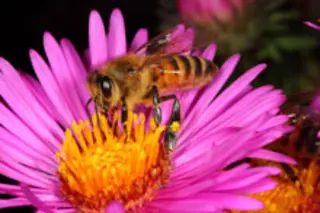Scientists have long wondered what exactly is killing bees in hives afflicted by colony collapse disorder (CCD), and now they may have found a clue. Bees in collapsing hives showed evidence of damaged ribosomes, which are crucial to protein production, according to a study published in the journal Proceedings of the National Academy of Science. The researchers suggest that an onslaught of viruses may be responsible for the cellular damage. The findings suggest that CCD, which has been blamed on everything from viruses to fungi to pesticides, may be linked to problems with protein production that could make bees more susceptible to these threats.
"If your ribosome is compromised, then you can't respond to pesticides, you can't respond to fungal infections or bacteria or inadequate nutrition because the ribosome is central to the survival of any organism. You need proteins to survive" [AP]
, said lead researcher May Berenbaum. To ...














